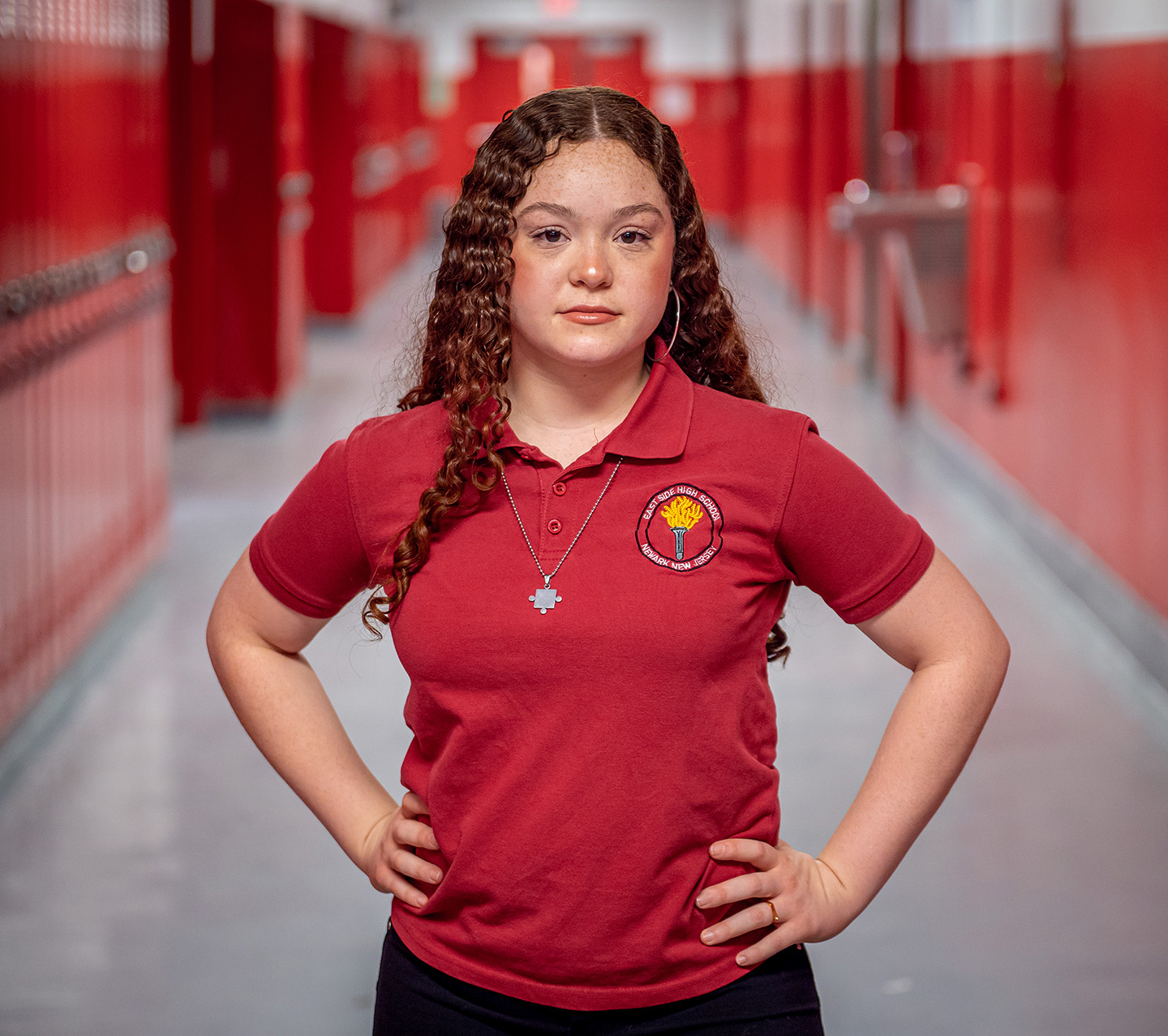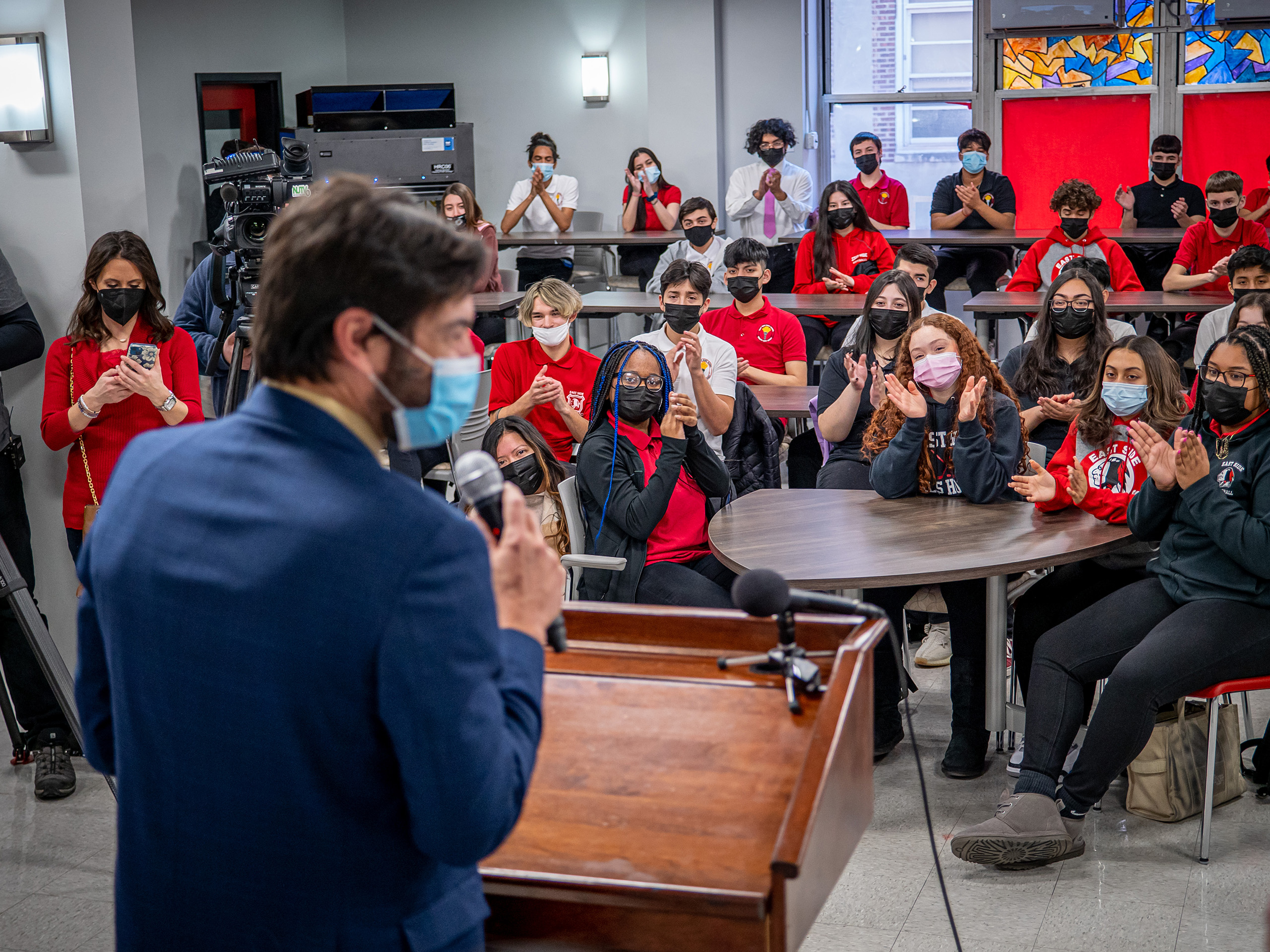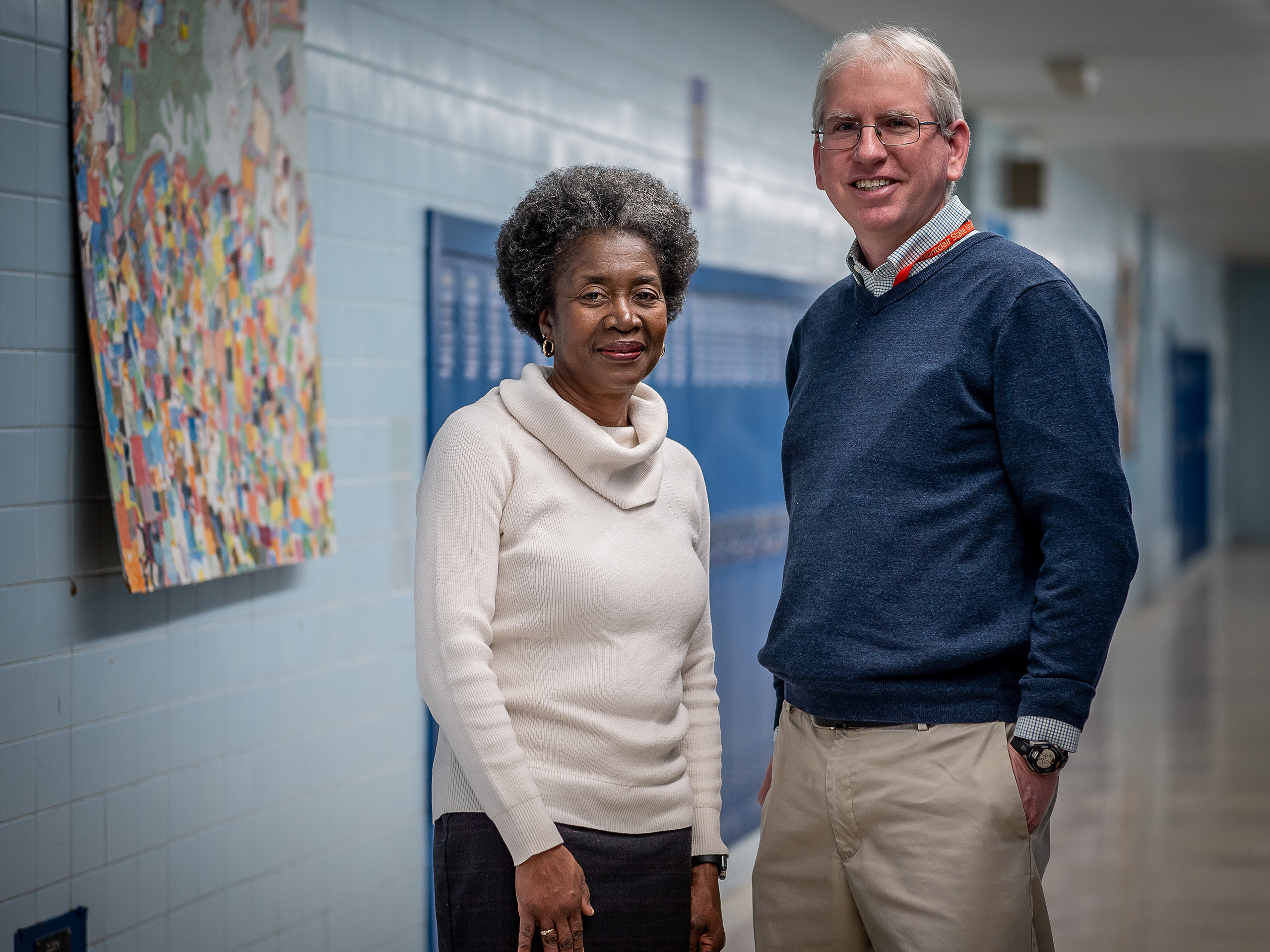
Going Home Again
Programs prepare students to give back by teaching in cities where they grew up
Melissa De Almeida loves Newark’s Ironbound district, a four-square-mile, largely working-class and restaurant destination near downtown, where Spanish and Portuguese are spoken daily. She lives there, attends high school in the heart of it and appreciates its diversity. When she graduates from Montclair State University, which she’ll begin attending full time this fall as part of a program to diversify the ranks of teachers in Newark, she’ll be able to return to teach in the neighborhood she calls home.
“It’s nice to be in an environment where there’s so many different cultures. You learn things from other cultures that you didn’t know,” says De Almeida, the daughter of Brazilian immigrants, who says she counts people of various ethnicities among her friends.
“I would like to come back and teach at my old middle school. Oliver Street School is a very important place to me. My cousins and older sister went there. I have history there. So going back would be like giving back to the teachers that taught me so much. Going back has always been in my plans.”
It’s also the plan of the University and its Red Hawks Rising Teacher Academy, one of several partnership programs Montclair has forged to recruit and prepare teachers of color, and provide crucial support in the early years of teaching.

De Almeida is a member of the first Red Hawks Rising Teacher Academy – a partnership between the University’s College of Education and Human Services, Newark Board of Education and the American Federation of Teachers (AFT) to help build a locally grown, diverse teacher workforce.
It’s a model that the rest of the nation should be paying attention to, according to U.S. Deputy Secretary of Education Cindy Marten.
“You’re showing the country how it’s done, right here in Newark,” said Marten during a March visit to the state’s largest school district. Participating students come from East Side High School, where De Almeida is a senior, and University High School.
The program received a significant boost in February when AFT President Randi Weingarten – joined by Montclair State University President Jonathan Koppell and Newark Board of Education Superintendent Roger León – announced that AFT will award each of the 21 students in the Red Hawks Rising Teacher Academy stipends of $3,700 to help offset education costs.

“We want to make sure that you can dream your dreams and achieve them,” Weingarten told the students, adding that the stipends are meant to make the goal of returning to teach in Newark “doable and workable for you.”
Why Diversity Matters
Nationally and statewide, those in education are focused on the demographic disparities between student populations and the teachers entrusted with their learning. Despite New Jersey being among the most diverse states in the country, its teachers are largely white and female, according to state reports. Only 16% of New Jersey’s almost 130,000 teachers are people of color, while 56% of students are. Research shows students benefit from having teachers who are of the same race or ethnic group and have similar cultural experiences.
“This significant cultural and linguistic mismatch has led to high suspension, expulsion and dropout rates as well as evidence of low academic expectations. Research shows that if a Black student has at least one Black teacher during their academic career, they are more likely to pursue post-secondary education,” says AFT Associate Director for Educational Issues Dyan Smiley, who works with Montclair and Newark program officials.
“We would eradicate the school-to-prison pipeline. Black and brown teachers are more apt to provide counseling and seek resources for students of color before calling law enforcement,” Smiley says. “To be clear, the goal is not to remove all white teachers, but to provide ongoing professional development and support to all teachers, so they become and further develop as culturally sustaining practitioners.”
Montclair Provides Paths
Montclair has become a magnet for students interested in going into urban education and there are many examples of graduates who return to teach in the schools they grew up in. During the AFT stipend announcement at East Side, covered by multiple media outlets, the Red Hawks Rising students needed to look no further for role models than several teachers present during the news conference.
Among them, Alex Diaz ’12 MAT, a bilingual biology and earth science teacher, would go on to tell CBS News, “You go back to where you want to teach because you want to affect your neighborhood, you want to make it better.” Diaz began his teaching career at East Side as an intern in the Urban Teacher Residency, another of the Montclair programs encouraging students to return to teach in their home districts.

Coming full circle, one of Diaz’s first students, Andreia Resende ’22, was hired to work alongside him as a biology teacher this past January. Resende is a graduate of another of the Montclair programs, the Noyce Science Teacher Program, inspired when she was a student at East Side being taught by Diaz, who saw her potential to pursue her love of science in college.
The story resonates with Center of Pedagogy Executive Director Jennifer Robinson. “I am inspired when our graduates who teach in high-need communities can have this depth of impact upon their students. It means they have found a way to light a spark that lifts their students above any challenges they have faced in their lives,” she says.
A Science Teacher Comes Full Circle
Resende’s story begins as a child in Brazil, where the family farm was her laboratory. She delighted in running after chickens, looking up at the trees. “I would compare the different birds because we had so many exotic birds on our land,” she says.
Shortly before Resende and her parents immigrated to America, developers purchased the surrounding property. She thought that would be a positive step for the poor, rural region, suggesting to her grandfather that perhaps the developers would turn the area around.
Her grandfather, she recalls, replied, “No, they’re going to destroy the whole land.”
Resende was just 8 at the time. “I didn’t know what he was talking about, but when I was 22 and went back to visit, I saw just how much destruction they caused, and how it affected my grandfather’s farm, too.”
The impact of deforestation on her homeland was a lasting lesson as she worked toward earning her degree in January 2022 and teacher certification in science. But the path from a farm girl chasing chickens to a young woman chasing her dreams wasn’t always easy, and that was another lesson she learned as well.
Challenges like doubting her own talents, limited financial resources and juggling full-time work with classes, would defer her ambitions. But despite the struggles, mentors like Diaz and her professors in the Noyce Science Teacher Program saw her potential, opened doors and guided her to scholarships to help make her dreams come true. Teaching and Learning Professor Douglas Larkin and Biology Professor Sandra Adams were important faculty mentors in helping her persevere while working full time as a registered dental assistant.

The professors helped her get back on track after Resende needed to take a break from classes. “She picked herself up, started again and never looked back. It was forward, full-steam ahead from there,” Adams says.
“Sometimes when students hit a stumbling block they disappear,” Larkin says. “It’s heart-wrenching every time it happens. Because Andreia was accepted as a Noyce scholar, she had that personal connection that wouldn't let her disappear.”
“It’s not easy doing both and they have always been ready to help with anything I needed,” Resende says, including tutoring, academic advice and finding new avenues of financial support.
‘Powerful Testament’

Another role model for students is Mayida Zaal, associate professor in the Department of Teaching and Learning who has been doing work in Newark on behalf of Montclair for years.
“Having this opportunity to support young teachers into the profession and then bringing back their knowledge is such a powerful testament to the kind of justice work that I’m committed to,” Zaal says.
As a first-generation Arab Latina, Zaal says she did not always know where she belonged. “Creating space for students from non-dominant groups in the teaching profession means they can be a part of transforming education in their own communities.”
As she begins her teaching career, Resende reflects, “I want to be able to encourage, to plant the seed where my students can believe in themselves and know that if they work hard enough that they can make it.”
De Almeida, who looks forward to the day she returns to the Ironbound district as a teacher, has shown she works hard, and when she attends Montclair in the fall with college credits to her name and a stipend, it will help lighten her family’s load. “As someone who wants to become a teacher and loves kids, this program is such a great opportunity,” she says. “I’ve always dreamed of coming back to teach in Newark because to me, Newark is home.”